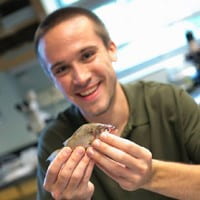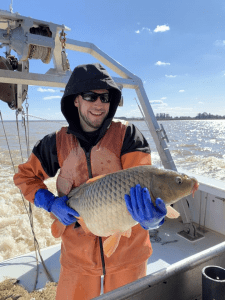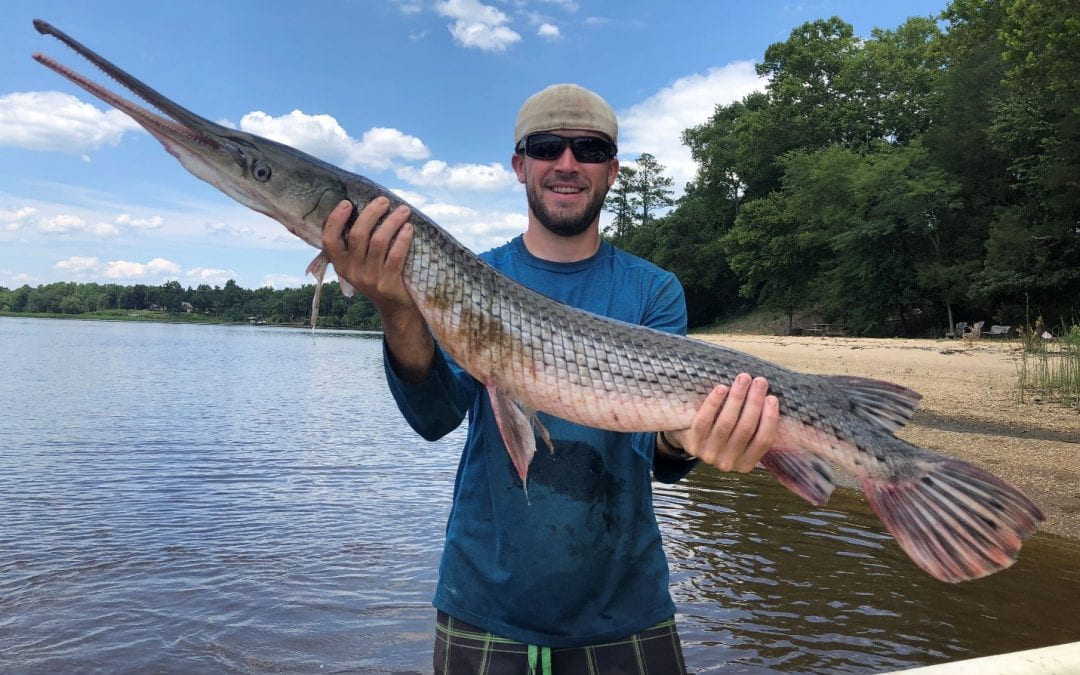
Brian holding a small adult white perch (Morone americana) collected in the Hudson River for his MS thesis research at Chesapeake Biological Laboratory.
Throughout my (still ongoing) education and career in aquatic ecology, I have developed a strong interest in how human impacts such as climate change, harvest, and contaminants influence the ecology and evolution of fishes. My four years as a Marine Vertebrate Biology major at SoMAS from 2009 to 2013 were crucial in jump-starting these interests, most notably though opportunities to conduct undergraduate research. After gaining important experience in three different labs, I took on a more ambitious role during my last two years, working with Mike Frisk, Anne McElroy and Bob Cerrato on a collaborative study of six historically overfished winter flounder populations along an urbanization gradient in Long Island. This project was a formative experience, as it made me grapple with the complexity of how different populations respond to multiple human impacts in the real world.
 After graduating from SoMAS, I completed an MS program at Chesapeake Biological Laboratory (part of the University of Maryland Center for Environmental Science) from 2013 to 2016, where I studied migration behavior and long-term abundance patterns in Hudson River white perch. Importantly, my previous experience at SoMAS gave me a firm background for this study, as I had already worked with white perch and familiarized myself with relevant laboratory techniques (especially working with fish otoliths) as an undergraduate. While I very much enjoyed doing research and taking classes as a student, I felt the need to take on a new type of role to become better-rounded, which led me to take my current job as chief scientist of the Juvenile Striped Bass Seine Survey at the Virginia Institute of Marine Science, one of the longest-running aquatic monitoring programs on the United States east coast. This job, in addition to being a lot of fun, has allowed me to broaden my skills and experiences in a way that would not have been possible if I had stayed in school
After graduating from SoMAS, I completed an MS program at Chesapeake Biological Laboratory (part of the University of Maryland Center for Environmental Science) from 2013 to 2016, where I studied migration behavior and long-term abundance patterns in Hudson River white perch. Importantly, my previous experience at SoMAS gave me a firm background for this study, as I had already worked with white perch and familiarized myself with relevant laboratory techniques (especially working with fish otoliths) as an undergraduate. While I very much enjoyed doing research and taking classes as a student, I felt the need to take on a new type of role to become better-rounded, which led me to take my current job as chief scientist of the Juvenile Striped Bass Seine Survey at the Virginia Institute of Marine Science, one of the longest-running aquatic monitoring programs on the United States east coast. This job, in addition to being a lot of fun, has allowed me to broaden my skills and experiences in a way that would not have been possible if I had stayed in school
Now, I am preparing to move on to the next step in my career, as I will be starting a PhD at Concordia University in Montreal this coming fall, with support from an internal fellowship and a Fulbright Award. My research will focus on how population characteristics and ecological feedbacks will promote or constrain adaptation to climate change across multiple populations of brook trout in Cape Race, Newfoundland. Such research will be crucial for informing the conservation and management of salmon, trout, charr, and other coldwater fish populations that will be threatened by climate change in the coming decades.




